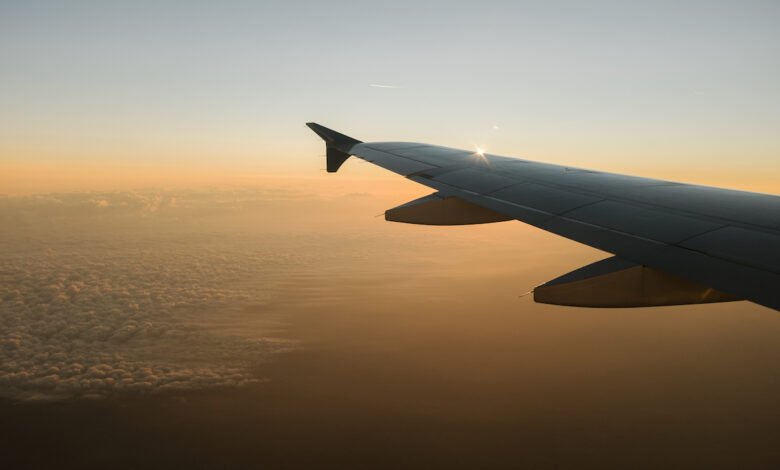Travel Bloat Remedies | HUM Nutrition Blog

We’re bringing you effective strategies to combat travel bloating! Explore the causes of bloating while on the road or in the sky and unlock practical tips and remedies to alleviate discomfort and enjoy a more pleasant and bloat-free vacay.
Bloating is one of the most common gut health woes and is frustrating (not to mention: so uncomfortable) to deal with in any situation, let alone when traveling. But, unfortunately for many of us, bloating loves a getaway and can leave us feeling uncomfortable and not our best selves while on vacation. “Bloating is the fermentation of gasses within the digestive tract which can happen from various foods, interactions, bacterial-food interactions, bacteria overgrowth, food sensitivities, and food allergies,” says Dr. Lana Butner, a board-certified naturopathic doctor and nutritionist. In addition to these causes, bloating can also occur throughout a woman’s cycle as ovulation and menstruation can trigger a bloating response, and can even be connected to physical activity (or lack thereof), too.
While all of these causes of bloating could very well be the reason for feeling a little puffy when traveling, there are some other reasons why we bloat when traveling.
Understanding Travel Bloating
When experiencing bloat while traveling, it’s entirely possible that some of the common causes of bloating might be to blame. However, it can sometimes be caused by travel itself. According to Butner, when we sit for long periods of time — such as in a car or on a plane — or decrease our physical activity (like skipping our usual workouts while traveling), bloating can occur because the stagnation leads to a slower or less active migrating motor complex (MMC). “The MMC is responsible for peristalsis, which is the rhythmic contraction of your intestines in order to move food along the intestinal tract,” she explains. The body responds to a slower MMC with bloat.
Travel bloating can also be related to the foods consumed while on vacation, which for some of us might be a little more indulgent than what we eat at home and upset our digestion. “Eating really salty or fried food can cause your body to hold onto extra water and cause you to bloat, too,” says Roxana Ehsani, a registered dietitian, nutritionist, and board-certified sports dietitian. “It may also happen when drinking carbonated beverages such as sparkling water or soda since those air bubbles can cause you to bloat,” she adds.
Stress is another cause of bloat, which is why you might feel bloated when you have a hectic travel day or flights get delayed or canceled. This is especially true in cases where stress leads to constipation because “being constipated can cause food to stay longer in intestines and cause a buildup and cause bloating,” says Ehsani. Additionally, eating too quickly — whether you’re on the go or simply in a hurry — can lead to bloat because you tend to swallow a lot of air when eating too fast which affects the body in a way that’s similar to drinking carbonated beverages.
No matter what the cause of bloating while traveling might be for you, there are some ways you can prepare for an upcoming trip in order to minimize bloating.
Preparing for Travel
In order to minimize potential travel bloat, experts say there are a few things you can do ahead of time in order to prepare for an upcoming trip.
First, Butner says to increase hydration prior to travel as proper hydration can aid the body’s digestive efforts and, therefore, might alleviate symptoms. Butner recommends drinking a minimum of three liters of water with electrolytes starting at least two days out from your trip to ensure you go into vacation and a travel day hydrated.
If you are prone to experience bloating after eating veggies like broccoli, kale, and cauliflower, or legumes such as beans, or lentils, Ehsani says to consider limiting high-fiber foods before traveling, too. “Although these foods are highly nutritious, they can cause bloating on their own as these foods take your system longer [to digest] since they move through your gut at a slower rate,” she explains. In addition to high-fiber foods, Ehsani says to also avoid eating a very fatty meal because “it will take your body longer to digest and may cause worsening symptoms once you step on the plane.” Salty meals pre-flight are also a no-no because they make you hold onto water more and, therefore, bloat more.
While there’s not much you can do about being stuck in a car or plane for hours, Ehsani says you can reduce the bloating effects of stagnation by breaking a sweat pre-travel. “Engage in your favorite sweat-breaking activity such as going on a long walk, jog, or workout class to get your blood flowing pre-flight.”
Bloating During Air Travel
When it comes to air travel, one of the main reasons why it can lead to bloat is its dehydration factor. “Flying is dehydrating altogether, both internally and externally,” says Butner. To alleviate this side effect of flying, she recommends increasing hydration before, during, and after flights, just like you would lather lotion or oils on the skin to alleviate the dehydrating effects. By staying hydrated on a plane, you can combat this flying woe and ensure the body is hydrated enough to support proper digestion.
Another reason why we bloat when flying is the lack of physical activity involved, especially when on a long flight. When flying, Liz McMahon, a registered dietitian who specializes in IBS and gut health, says to get up every couple of hours and walk down the aisle. When in the airport, it also helps to stay active and walk around (which is the perfect excuse to peruse the book selections at the airport convenience stores) before boarding the plane. In cases where you can’t get up from your seat, Meme Inge, MS, RDN, says to try plane exercises like “seated twists, forward folds, or pulling the knees toward your chest to alleviate bloat.”
Plane food can also contribute to bloating as many options aren’t very healthy or are a tad too close to the salty side of the spectrum. One way you can combat this is by preparing ahead of time and packing healthy snacks and meals. McMahon recommends a combination of protein, fat, and carbohydrates and says try not to overdo the fiber in-flight since that can lead to bloating. She also recommends not drinking from straws “which can cause you to swallow air and feel bloated. Chewing gum is a popular remedy for alleviating the side effects of air pressure on the ears and is often a go-to for preventing those painful pops. However, it can also cause bloat since it causes you to swallow air, just like straws and fizzy drinks. “Sugar alcohols in gum can lead to digestive discomfort, too,” says McMahon.
Bloating During Road Trips
Similar to airplane travel, one of the common causes of stomach bloat during a road trip is lack of physical activity, which as Butner explains earlier, can slow down the digestive tract and create bloating in response. Another common factor is the poor food choices made along the way as many (okay, most) roadside restaurants feature heavy, indulgent foods that are typically extra salty or fried and hard on the digestive system.
While it might add some extra time to your travel itinerary, McMahon says it’s important to schedule breaks so you can get up and walk around throughout the trip in order to stimulate the digestive system and help keep yourself regular. With regular breaks scheduled, you can also ensure you stay hydrated enough to manage bloat while also not having to worry about bathroom breaks along the way.
In addition to scheduling breaks, it’s also worth packing a healthy lunch or dinner and snacks as well, that way you don’t end up in a situation where the only option is bloat-causing fast food. In situations where this isn’t a possibility, consider looking up roadside restaurants ahead of time and examining the menu for healthier options so that you are more prepared when making a pit stop.
Coping With Vacation Bloat
If bloat is persistent on vacation, there are ways to cope with this gut health woe, starting with hydration. Drinking water throughout the day and avoiding dehydrating or sugar-rich foods such as coffee, soda, and sugary cocktails can help you stay hydrated and avoid irritating the gut even further. Additionally, consuming herbal teas can also do the trick. There are some herbal tea blends specifically designed for bloating and gas, however, something soothing on the stomach like chamomile or mint can do the trick, too.
Remaining active can also help manage vacation bloat. Depending on the type of travel, you might already have plans to stay active on your trip through site-seeing and other travel plans, which can help keep your digestive system working more efficiently. However, if your vacation is more about lounging by the pool and beach, it’s worth scheduling regular exercises for yourself while on vacation. One thing we do in order to stay consistent with movements while traveling is pre-select online workouts we want to do and then schedule them onto our calendar as if they are an in-person workout class to hold ourselves accountable.
Another practical thing you can try while vacationing is mindful eating. When we eat in a hurry, we tend to swallow more air which can cause bloating and discomfort in the gut. To counter this, take your time and be more mindful while chewing food. This will not only allow you to savor all of the different foods you might try on a trip and provide a more sensory-rich dining experience but it will also contribute to bloat relief, too.
Remedies for Travel Bloating
In addition to the tips above, there are a few additional ways you can remedy travel bloat. Here are some expert-approve tips for relieving bloat while traveling.
Consume natural herbal teas for bloating: Ehsani says one of the best ways to relieve bloat when traveling is to use the power of herbal teas for bloating. She recommends sipping on peppermint, ginger, or fennel tea while traveling as all of these natural ingredients can help reduce bloat and even calm down an upset stomach. If you don’t love tea, peppermint capsules are also worth considering, since “peppermint is an antispasmodic, so it will help relax the muscles in your intestines,” says McMahon.
Fiber supplements: If you experience constipation while traveling — which causes bloating — McMahon also recommends having fiber supplements on hand as these can keep you more regular. With that being said, she reminds us to drink plenty of water with fiber supplements as fiber supplements can make you more bloated if you aren’t hydrated.
Pack probiotics: When packing your bags for a trip, Butner says to add a non-refrigerated probiotic to your toiletry bag since probiotics can balance bacteria in the gut. Butner says probiotics are also helpful when traveling because they can alleviate upset stomachs caused by foods your body might not be used to in the short term.
Don’t forget the electrolytes: Butner also recommends keeping electrolytes on hand as these can up the hydration ante and “keep the bowels, kidneys, and liver functioning at maximum capacity” which can help relieve and even prevent bloat.
Go for walks: Movement is super important in order to prevent and even relieve bloat. But if hitting the hotel gym isn’t for you, Butner says the simple act of walking can work wonders and really do the trick since walking helps alleviate trapped gas and can even decrease bloating within the first few minutes of movement.
The Travel Takeaway
While travel bloat might seem like a vacation ruiner, there are many things you can do to not only alleviate but also prevent bloating from occurring. Overall, the two most important things to keep in mind are movement and hydration as both impact the digestion process and both tend to take a backseat on travel days. It’s also worth packing a few supplies — including herbal tea, probiotics, and electrolytes — to help you feel more prepared and less stressed when bloating does occur, that way you can enjoy your travels without feeling too distracted by the discomfort.
Source link
#Travel #Bloat #Remedies #HUM #Nutrition #Blog



